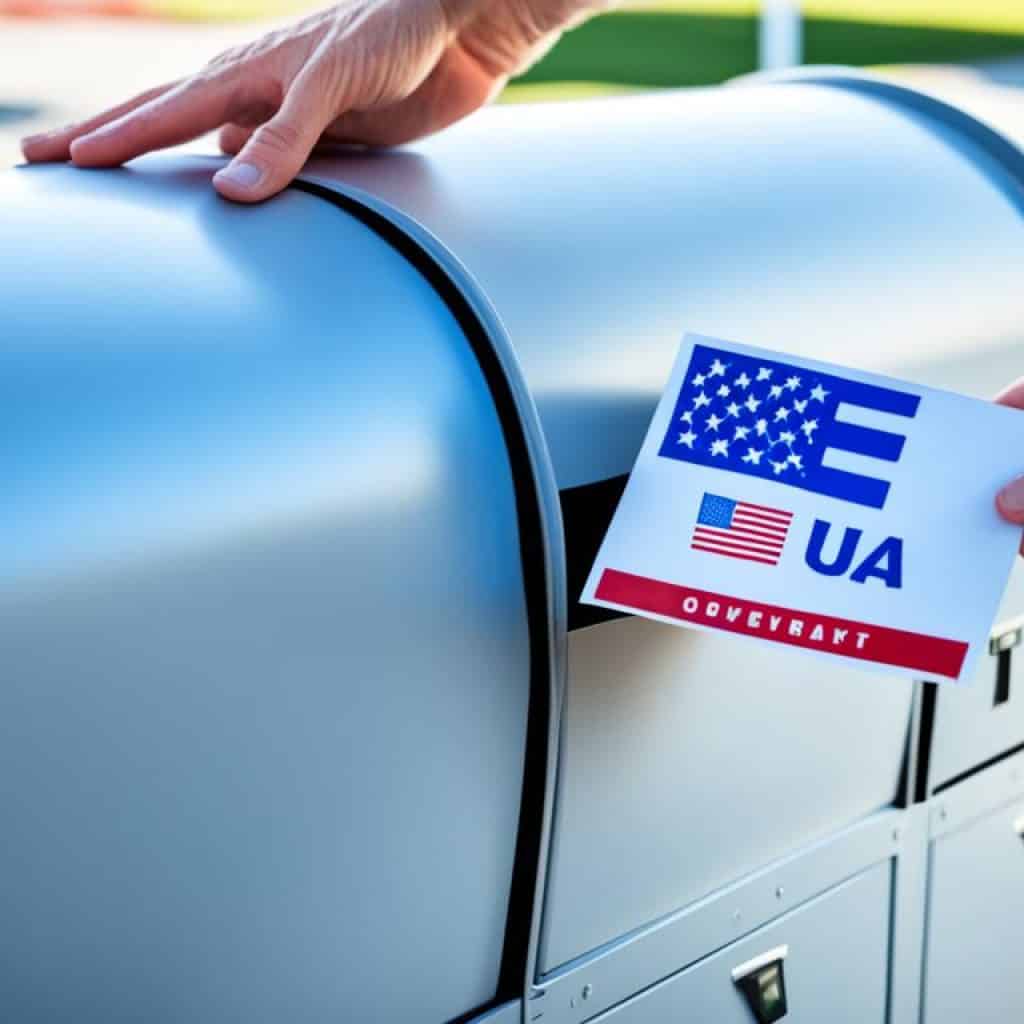Are you a US citizen looking to marry your foreign partner and bring them to the United States? The K-3 Visa may be your answer! This unique visa allows the foreign-citizen spouse of a US citizen to enter the US while awaiting approval of their immigrant visa petition. It’s designed to shorten the physical separation between spouses and provide a pathway for the foreign spouse to apply for permanent residency. But how does it work? And what are the requirements? Let’s dive into the world of the K-3 Visa and explore the journey of marrying abroad and uniting in the US.
Key Takeaways:
- The K-3 Visa allows the foreign-citizen spouse of a US citizen to enter the US while awaiting approval of their immigrant visa petition.
- It is designed to shorten the physical separation between spouses and provide a pathway for the foreign spouse to apply for permanent residency.
- The K-3 Visa application process involves filing petitions, providing documentation, undergoing a medical examination, and proving financial support.
- Living together or common-law marriages do not qualify as marriages for immigration purposes.
- Each US Embassy or Consulate may have additional instructions and requirements for K-3 visa applicants, so it’s important to review their specific guidelines.
Overview – What is a K-3 Visa?
A K-3 visa is a nonimmigrant visa designed for the foreign-citizen spouse of a US citizen. Its purpose is to minimize the separation period between spouses by allowing the foreign spouse to enter and reside in the US while awaiting approval of their immigrant visa petition. This visa category offers a temporary solution to bring spouses together more quickly and facilitates the subsequent application for permanent residency.
Upon approval of the immigrant visa petition, the K-3 visa recipient can apply for permanent residency as a permanent resident (LPR) through the Department of Homeland Security. This allows the foreign-citizen spouse to live and work in the US with their US citizen partner on a more permanent basis.
The K-3 visa follows a two-step process: the initial issuance of a nonimmigrant visa and the subsequent adjustment of status to become a permanent resident. This process significantly reduces the time spent apart for married couples and provides an opportunity for families to be together in the US.
| Benefits of the K-3 Visa | Limitations of the K-3 Visa |
|---|---|
|
|
It’s important to understand the requirements and procedures involved in the K-3 visa application process to ensure a smooth transition for the foreign-citizen spouse and their US citizen partner. Let’s explore the specific steps and documentation in more detail to navigate the path to obtaining a K-3 visa.
What is a “Spouse”?
A “spouse” refers to a legally wedded husband or wife. In the context of US immigration, a spouse plays a crucial role in the immigration benefits provided by the US government. Both opposite-sex and same-sex spouses of US citizens and lawful permanent residents are now eligible for the same immigration benefits.
It is important to note that living together or entering into common-law marriages do not qualify as marriages for immigration purposes. In cases of polygamy, only the first spouse is eligible for immigration benefits.
In recent years, the immigration system in the US has evolved to recognize and provide equal rights and benefits to spouses, irrespective of their gender or sexual orientation. This progressive stance allows all married couples, regardless of their gender, to enjoy the same immigration benefits and opportunities offered by the US government.
If you are a spouse of a US citizen or a lawful permanent resident, you have the opportunity to navigate the immigration process with your loved one, taking advantage of the benefits provided specifically for spouses.
“A successful marriage requires falling in love many times, always with the same person.” – Mignon McLaughlin
The International Marriage Broker Regulation Act of 2005 (IMBRA)
The International Marriage Broker Regulation Act of 2005 (IMBRA) plays a crucial role in regulating the interactions between US citizens and foreign-born fiancé(e)s or spouses. This act aims to ensure the safety and rights of both parties involved in international marriages.
Under IMBRA, US citizens who are sponsoring foreign-born fiancé(e)s or spouses are required to disclose certain information about their criminal and marital history to the beneficiary. These disclosures help the foreign-born individuals make informed decisions about their potential relationships.
Specific details about the IMBRA requirements can be found in the instructions for Form I-129F, also known as the Petition for Alien Fiancé(e). This form provides comprehensive guidance for US citizens who are seeking to bring their foreign-born partners to the United States.
It is important to carefully review and comply with the IMBRA requirements when applying for a K-3 visa or any other visa category involving international marriage. By adhering to these regulations, individuals can ensure a smooth visa application process and provide transparency in their relationships.
The First Step: Filing the Petitions
The first step in the K-3 visa application process is filing the necessary petitions with the appropriate authorities. As a US citizen sponsor, you will need to submit Form I-130, Petition for Alien Relative, to the U.S. Citizenship and Immigration Services (USCIS). This form establishes your relationship with your foreign-citizen spouse and serves as the initial request for their immigrant visa.
In addition to the Form I-130, you also need to file Form I-129F, Petition for Alien Fiancé(e), specifically designed for your foreign-citizen spouse. This form demonstrates your intent to bring your foreign spouse to the US while awaiting the approval of the immigrant visa petition. Both forms should be filled out accurately and completely to avoid any delays in the processing of your petitions.
Once you have submitted the petitions, USCIS will review them and make a determination. If approved, the petitions will then be forwarded to the National Visa Center (NVC) for further processing.

By filing the Form I-130 and Form I-129F promptly and correctly, you are initiating the K-3 visa process and taking the first step toward bringing your foreign-citizen spouse to the US.
The Second Step: Applying for a Visa
Once the National Visa Center (NVC) receives the approved I-129F petition, it will send the petition to the appropriate US Embassy or Consulate in the country where the marriage took place. This is a crucial step in the K-3 visa application process.
In order to obtain the K-3 visa, the applicant spouse must apply at the US Embassy or Consulate. Here’s a breakdown of the key components involved:
- Form DS-160: The applicant spouse must complete and submit Form DS-160, which is the Online Nonimmigrant Visa Application. This form gathers necessary information about the applicant and their intended stay in the US.
- Medical Examination: The applicant spouse is required to attend a medical examination by a designated physician. This examination ensures that the spouse meets the health requirements for entry into the US. The medical examination aims to ensure public health and is an essential part of the visa application process.
- Interview: After completing the medical examination, the applicant spouse will have an interview with a consular officer at the US Embassy or Consulate. The purpose of the interview is to assess the eligibility and suitability of the applicant for the K-3 visa. The officer will ask questions to verify the relationship between the US citizen spouse and the applicant, as well as their intentions to comply with the visa requirements.
It is crucial for the applicant spouse to be well-prepared for the interview. They should bring all required documents, such as their passport, marriage certificate, and any supporting evidence of the relationship. The interview is an opportunity for the applicant to demonstrate their eligibility and genuine intention to comply with US immigration laws.
Tip: Be sure to review the specific instructions provided by the US Embassy or Consulate where the interview will take place. Each location may have additional requirements or procedures specific to that embassy or consulate.
Visa Interview Tips:
- Prepare: Take the time to thoroughly review your application and supporting documents before the interview. Be ready to answer questions about your relationship with the US citizen spouse and your plans for living in the US.
- Be Honest: Provide truthful and accurate information during the interview. It is important to build trust and credibility with the consular officer.
- Dress Professionally: The visa interview is a formal process, so dress in appropriate attire. This demonstrates respect for the process and leaves a positive impression.
- Stay Calm and Positive: It is normal to feel nervous, but try to remain calm and focus on providing clear answers. Maintain a positive attitude throughout the interview.
- Answer Directly: Be concise and answer the questions asked. Avoid volunteering excessive information unless requested by the consular officer.
By following these steps and tips, applicants can increase their chances of a successful K-3 visa application. Remember, applying for a visa can be a complex process, so it is important to thoroughly understand the requirements and seek professional guidance if needed.
Required Documentation
When applying for a K-3 visa, it is important to gather and provide the necessary documentation to support your application. The required documents include:
1. Form DS-160
Complete and submit Form DS-160, which is the online nonimmigrant visa application form used by the Department of State. This form collects information about your background and purpose of travel.
2. Passport
Ensure that you have a valid passport that will remain valid for the duration of your travel to the United States. The passport should have at least six months of validity remaining.
3. Civil Documents
Provide civil documents to establish your identity, marital status, and relationship with your US citizen spouse. Examples of civil documents may include:
- Birth certificate
- Marriage certificate
4. Police Certificates
You will need to obtain police certificates from all countries where you have resided for six months or longer since the age of 16. These certificates are used to verify your character and ensure you meet the admissibility requirements.
5. Medical Examination
Undergo a medical examination by an authorized panel physician. This examination is to assess your overall health and determine if you have any medical conditions that may affect your admissibility to the United States.
6. Financial Support
Demonstrate evidence of financial support to ensure you will not become a public charge in the United States. This may include providing an Affidavit of Support from your US citizen spouse, along with supporting financial documentation.
It is important to note that some documents may need to be translated into English. The translation should be certified and include the translator’s signature and contact information.
By providing the required documentation, you can strengthen your K-3 visa application and increase the chances of a successful outcome. Make sure to review the specific document requirements provided by the US Embassy or Consulate where you will be applying.
Review Additional U.S. Embassy/Consulate-Specific Instructions
When applying for a K-3 visa, it is crucial to pay attention to the specific instructions and additional requirements set by the U.S. Embassy or Consulate. Each embassy/consulate may have its own set of guidelines that applicants must adhere to. These instructions are designed to ensure a smooth and successful visa application process.
By carefully reviewing the U.S. Embassy/Consulate-Specific Instructions, applicants can gather all the necessary documents and information required for their visa application. This step is vital to avoid any delays or complications that may arise due to missing or incomplete requirements.
U.S. Embassy/Consulate-Specific Instructions may include details on the specific forms to be submitted, additional supporting documents, and any other specific requirements that applicants need to fulfill. Following these instructions diligently helps applicants present a comprehensive and well-prepared visa application.
Make sure to thoroughly review the U.S. Embassy/Consulate-Specific Instructions to ensure that you meet all the additional requirements. By doing so, you can enhance your chances of a successful K-3 visa application.
By following the specific instructions provided by the U.S. Embassy or Consulate, applicants can demonstrate their commitment to the visa application process and their willingness to comply with all necessary procedures. This attention to detail can significantly impact the overall success of the visa application.
Key Points to Remember:
- – Thoroughly review the U.S. Embassy/Consulate-Specific Instructions.
- – Gather all the necessary documents and information based on the instructions provided.
- – Pay close attention to any additional requirements or forms that need to be submitted.
- – Ensure compliance with the specific guidelines set by the U.S. Embassy or Consulate.

By following the U.S. Embassy/Consulate-Specific Instructions, applicants can demonstrate their commitment to a successful K-3 visa application.
Medical Examination and Vaccination Requirements
K-3 visa applicants are required to undergo a medical examination performed by an authorized panel physician. This examination is an essential step in the visa application process and helps ensure the health and safety of both the applicant and the US population.
During the medical examination, the authorized panel physician will assess the applicant’s overall health and check for the presence of any communicable diseases. The physician will also review the applicant’s medical history, conduct a physical examination, and perform any necessary laboratory tests.
Additionally, vaccination requirements may be applicable depending on the applicant’s age, medical history, and previous immunizations. While vaccinations are optional for K visa issuance, it is highly recommended that applicants complete the required vaccinations to protect their health and well-being.
To find an authorized panel physician in your country and obtain detailed information about the medical examination process, visit the official Department of State website for comprehensive guidance on the medical examination requirements for K-3 visas.
Ensuring that you comply with the medical examination and vaccination requirements is crucial for a successful K-3 visa application. By following these guidelines, you can ensure a smooth process and increase your chances of obtaining the visa to reunite with your US citizen spouse.
“The health and well-being of visa applicants are of paramount importance. The medical examination is a vital step in the K-3 visa application process, ensuring the safety of both the applicant and the US population.”
Proof of Financial Support and Affidavit of Support forms
When applying for a K-3 visa, one of the essential requirements is to provide proof of financial support during the visa interview. This serves to demonstrate that the US citizen spouse can financially support the foreign-citizen spouse throughout their stay in the United States.
An important document to include in your visa application is the Form I-134, Affidavit of Support. This form is completed by the US citizen spouse and serves as a legal declaration of their intention to financially support the foreign-citizen spouse. The Form I-134 provides information about the US citizen sponsor’s employment, income, and assets, highlighting their ability to meet the financial obligations of the visa applicant.
| Document | Purpose |
|---|---|
| Form I-134, Affidavit of Support | Demonstrates the US citizen spouse’s ability to financially support the foreign-citizen spouse during their stay in the US. |
In addition to the Form I-134, the US citizen spouse may also need to submit the Form I-864, Affidavit of Support, to USCIS during the adjustment of status process. The Form I-864 is a legally binding contract that ensures the foreign-citizen spouse will not become a public charge and relies on the financial support provided by the US citizen spouse.
Having both the Form I-134 and Form I-864 as part of your application strengthens your case by providing concrete evidence of the US citizen spouse’s financial responsibility and commitment to supporting the foreign-citizen spouse.
Remember that the financial support requirements may vary depending on the specific circumstances. It is important to consult with an immigration attorney or seek guidance from the official USCIS website for the most up-to-date and accurate information.
Fees – How Much Does a K Visa Cost?
When applying for a K-3 visa, it is important to be aware of the various fees associated with the application process. These fees include filing fees for Form I-130, Petition for Alien Relative, and Form I-129F, Petition for Alien Fiancé(e). However, it is crucial to note that the exact amount of fees can vary, and it is recommended to check the USCIS website for the most up-to-date fee information.
Below is a breakdown of the filing fees for the K-3 visa application:
| Form | Filing Fee |
|---|---|
| Form I-130 | $560 |
| Form I-129F | $535 |
It is important to ensure that the correct fees are paid when submitting the visa application to avoid delays or rejection.
Please note: The fees mentioned above are subject to change. For the most accurate and up-to-date information on K visa fees, it is recommended to visit the official USCIS website.

Rights and Protections – Pamphlet
K-3 visa holders, like other immigrant visa holders, have certain rights and protections in the US. To ensure that visa holders are aware of their entitlements, the US Department of State has prepared a comprehensive pamphlet outlining the rights and protections available to them. This informative resource is readily available on the Department of State’s website and serves as a valuable guide for K-3 visa holders.
By familiarizing themselves with the contents of the pamphlet, K-3 visa holders can gain a better understanding of their rights and the legal safeguards that are in place to protect their well-being. The pamphlet covers a wide range of topics, including but not limited to:
- Employment rights and privileges
- Access to healthcare and social services
- Education opportunities for visa holders and their dependents
- Freedom from discrimination
- Protections against human trafficking and domestic violence
- Legal redress in case of rights violations
Empowering and informative, the pamphlet ensures that K-3 visa holders are well-informed about their rights and the necessary steps to take if they feel their rights are being infringed upon. It serves as a valuable resource that can assist visa holders in navigating their new life in the United States with confidence and security.
“Acquiring knowledge and understanding of your rights is the first step towards protecting and advocating for yourself. Stay informed and empowered.”
| Rights and Protections | Pamphlet Overview |
|---|---|
| 1 | Employment rights and privileges |
| 2 | Access to healthcare and social services |
| 3 | Education opportunities for visa holders and their dependents |
| 4 | Freedom from discrimination |
| 5 | Protections against human trafficking and domestic violence |
| 6 | Legal redress in case of rights violations |
My Petition Expired – Can It Be Extended?
If your K-3 visa petition expires before approval, unfortunately, it cannot be extended. However, there is still hope to continue the K-3 visa application process. You have the option to file a new petition with the U.S. Citizenship and Immigration Services (USCIS) and carry on with your efforts to reunite with your spouse in the United States.
While it may be disappointing to see your petition expire, it’s important to stay positive and take action by submitting a fresh petition. The USCIS understands that the circumstances surrounding visa applications can change, and they provide an opportunity for you to restart the process and pursue your K-3 visa.
When filing a new petition, it is crucial to ensure that all required forms and supporting documents are accurately completed and submitted. This includes the Form I-130, Petition for Alien Relative, filed by the U.S. citizen sponsor, and the Form I-129F, Petition for Alien Fiancé(e), for the foreign-citizen spouse.
By filing a new petition, you have the chance to present any updated information or additional evidence that may support your case. It’s important to carefully review the forms and instructions provided by the USCIS to ensure that you meet all the requirements and address any specific concerns that may have caused the previous petition to expire.
Remember, the K-3 visa is designed to shorten the physical separation between spouses, allowing the foreign spouse to enter and reside in the United States while awaiting approval of the immigrant visa petition. By filing a new petition, you can continue pursuing this goal and work towards reuniting with your loved one.
“Although your K-3 visa petition may have expired, you can still take action by filing a new petition. Stay proactive and make sure to thoroughly complete all required forms and provide any necessary supporting documents. Don’t lose hope – you’re one step closer to being reunited with your spouse in the United States.”
Quick Tips:
- Submit a new petition with the USCIS if your K-3 visa petition has expired.
- Ensure all required forms and supporting documents are accurately completed and submitted.
- Stay positive and provide any updated information or additional evidence that may support your case.
- Thoroughly review the forms and instructions provided by the USCIS to meet all requirements.
Ineligibilities for Visas – What if I am ineligible for a K visa?
Obtaining a K visa may not be possible if you are deemed ineligible due to certain grounds of inadmissibility. These grounds can include factors such as a criminal history, previous immigration violations, or health-related issues. However, it is important to note that in some cases, there may be a waiver of inadmissibility available that can provide an opportunity to overcome these grounds and still obtain a K visa.
Ineligibilities for visas are assessed by the U.S. Department of State and U.S. Citizenship and Immigration Services (USCIS) during the visa application process. The purpose of these ineligibilities is to ensure the safety and security of the United States and its citizens.
If you believe you may be ineligible for a K visa, it is recommended to consult with an immigration attorney or an accredited representative to understand your options and determine if a waiver of inadmissibility may be available in your particular circumstances.
Grounds of Inadmissibility
The grounds of inadmissibility for a K visa are outlined in the Immigration and Nationality Act (INA). These grounds include:
- Criminal convictions for certain offenses
- Violations of U.S. immigration laws
- Health-related issues
- Security concerns
- Involvement in human trafficking or other serious crimes
- Fraud or misrepresentation in obtaining a visa
These grounds of inadmissibility serve as a basis for determining an individual’s eligibility for a K visa and are thoroughly reviewed during the visa application process.
Waiver of Inadmissibility
In certain circumstances, a waiver of inadmissibility may be available to individuals who are deemed ineligible for a K visa due to specific grounds. A waiver allows the individual to overcome the inadmissibility and still be issued a visa.
The availability and eligibility requirements for a waiver of inadmissibility vary depending on the specific ground of ineligibility and the individual’s personal circumstances. It is important to note that not all grounds of inadmissibility have a waiver option, and even if a waiver is available, it is not guaranteed to be granted.
To request a waiver of inadmissibility, it is necessary to submit a formal application and provide evidence or documentation to support the request. The waiver application undergoes a thorough review by USCIS or the U.S. Department of State, depending on the circumstances.
It is advised to consult with an immigration attorney or an accredited representative if you believe you may need a waiver of inadmissibility for a K visa. They can provide guidance on the specific requirements and assist in compiling a strong waiver application.
Conclusion
In conclusion, the K-3 Visa is designed to reduce the physical separation between US citizens and their foreign-citizen spouses while the immigrant visa petition is being processed. This nonimmigrant visa allows the foreign spouse to enter and reside in the US, providing the opportunity to build a life together while awaiting approval for permanent residency.
Throughout the application process, it is essential to diligently follow the specific instructions provided by the US Embassy or Consulate. This includes filing the necessary petitions, submitting all required documentation, completing a medical examination, and attending an interview. By carefully adhering to these guidelines, applicants can ensure a smooth visa application process and increase their chances of success.
If you are considering applying for a K-3 Visa, it is crucial to familiarize yourself with the requirements and procedures involved. Obtaining legal advice and assistance can also help navigate any challenges that may arise along the way. With proper preparation, patience, and attention to detail, you can unite with your US citizen spouse and begin your life together in the United States.
FAQ
What is a K-3 Visa?
A K-3 visa is a nonimmigrant visa that allows the foreign-citizen spouse of a US citizen to enter and reside in the US while awaiting approval of their immigrant visa petition. The purpose of the visa is to shorten the separation between spouses and allows the foreign spouse to apply for permanent residency.
Who qualifies as a “spouse” for immigration purposes?
A “spouse” refers to a legally wedded husband or wife. Same-sex spouses of US citizens and lawful permanent residents are now eligible for the same immigration benefits as opposite-sex spouses. Living together or common-law marriages do not qualify as marriages for immigration purposes, and in cases of polygamy, only the first spouse can qualify.
What is the International Marriage Broker Regulation Act of 2005 (IMBRA)?
The International Marriage Broker Regulation Act of 2005 (IMBRA) imposes certain requirements on US citizens sponsoring foreign-born fiancé(e)s and spouses. IMBRA requires the petitioner to disclose certain information about their criminal and marital history to the foreign-born beneficiary. Specific information about IMBRA requirements can be found in Form I-129F, Petition for Alien Fiancé(e) instructions.
What is the first step in the K-3 visa application process?
The first step is for the US citizen sponsor to file Form I-130, Petition for Alien Relative, with USCIS. Additionally, the US citizen sponsor must file Form I-129F, Petition for Alien Fiancé(e), for their foreign-citizen spouse. Once the petitions are approved, they will be sent to the National Visa Center (NVC) for processing.
What is the second step in the K-3 visa application process?
After the NVC receives the approved I-129F petition, it will send the petition to the appropriate US Embassy or Consulate in the country where the marriage took place. The applicant spouse must then apply for the K-3 visa at the US Embassy or Consulate. This step involves completing Form DS-160, attending a medical examination, and attending an interview at the US Embassy or Consulate.
What documents are required for the K-3 visa application?
The required documents include a completed Form DS-160, a valid passport, civil documents such as a birth certificate and marriage certificate, police certificates from all countries of residence, a medical examination, evidence of financial support, and photographs. Translations of foreign documents may be required.
Are there additional instructions and requirements for K-3 visa applicants?
Yes, each US Embassy or Consulate may have additional instructions and requirements for K-3 visa applicants. It is important to review the U.S. Embassy/Consulate-Specific Instructions to ensure that all necessary documents and information are provided for the visa application.
Is a medical examination required for the K-3 visa?
Yes, K-3 visa applicants are required to undergo a medical examination performed by an authorized panel physician. The examination includes vaccinations, although they are optional for K visa issuance. A list of authorized panel physicians by country and additional information about the medical examination can be found on the Department of State website.
What proof of financial support is required for the K-3 visa?
K-3 visa applicants must provide evidence of financial support during the visa interview. This may include Form I-134, Affidavit of Support, completed by the US citizen spouse. The US citizen spouse may also need to submit Form I-864, Affidavit of Support, to USCIS during the adjustment of status process.
How much does a K-3 visa cost?
There are various fees associated with the K-3 visa application process, including filing fees for Form I-130 and Form I-129F. The exact amount of fees can vary, so it is important to check the USCIS website for the most up-to-date fee information.
What rights and protections do K-3 visa holders have?
K-3 visa holders, like other immigrant visa holders, have certain rights and protections in the US. The US Department of State provides a pamphlet that outlines these rights and protections, which can be found on their website.
Can a K-3 visa petition be extended if it expires?
No, if a K-3 visa petitioner’s petition expires before approval, it cannot be extended. However, the petitioner may file a new petition and continue the K-3 visa application process.
What if I am ineligible for a K visa?
There are various grounds of ineligibility that can prevent an individual from obtaining a K visa. These ineligibilities can include criminal history, previous immigration violations, or health-related issues. In certain cases, a waiver of inadmissibility may be available to overcome these grounds.








Add comment